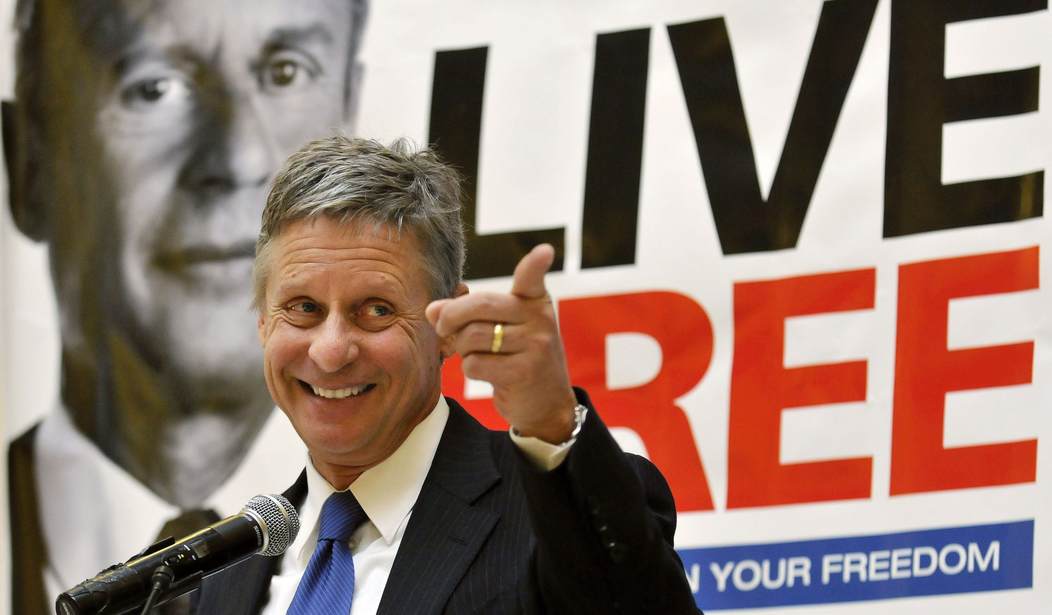If you could describe the top three American political philosophies in terms of family member roles, it might sound like this:
- Conservatives are like parents, always disciplining the kids.
- Liberals are like grandparents, always spoiling the kids.
- Libertarians are like crazy uncles, buying the kids beer and bringing them to the race track.
For something to be funny, it has to have some truth to it. So what is it with libertarians that makes them the crazy uncle? Is the crazy uncle label warranted, or just a huge misunderstanding?
More formally, we could say libertarianism maximizes individual freedoms and minimizes government actions. Whereas, modern liberalism maximizes government largesse and minimizes individual responsibility. Conservatism lies somewhere between these two extremes; a position I will briefly expand upon later.
Most libertarians understand a Libertarian Party (LP) candidate will not win the presidency, so the next goal is to have a candidate articulate the libertarian message. Therefore, given an election year where both major party candidates enjoy support more because of their opponent’s negatives than their own positives, the LP has blown a huge opportunity to make its message better known and possibly make a meaningful impact on the American political dialogue. In nominating Gary Johnson, it’s almost as if the LP decided, “Hey, let’s nominate someone who can’t articulate our policies, can’t excite our base, and has high negatives too.”
Johnson described his platform as, “I think it’s what most people are all about – being fiscally conservative and socially don’t give a damn.” To a libertarian, being called a fiscal conservative amounts to fighting words, because fiscally no self-respecting libertarian would consider themselves that far “left.” Thus, Johnson’s low approval within the party has caused many libertarians to disown him even before his nomination.
With all this internal opposition to Johnson, how did Johnson win the LP nomination? We know how Trump won the GOP nomination: the rank and file rejected the party establishment. With libertarians, shunning any central authority or organized attempts to instill a top down order is part and parcel of their philosophy and culture. The nominating process ends up as an attempt at herding cats.
Unlike his fiscal statement, Johnson’s general statement on social issues aligns more with the LP. But when you look at his positions on specific issues, he is anything but libertarian or even conservative. However, on social issues, the problem is not just with Johnson, but with libertarianism itself. In social policy, many people believe, in spite of what Johnson or libertarianism say, that in certain cases they do give a damn what someone does because there is a cause and effect to someone’s actions that often cannot be neatly separated from their effects on the larger group.
When given the opportunity to show how libertarianism might apply its social policy theory to the case of a religious baker refusing to bake a cake for a gay couple, Johnson suggested, ludicrously, the baker should have to bake the cake but not frost it. It was almost like Johnson was trying to play Solomon.
Libertarians would say the correct response should have been more along the lines of the baker isn’t required to bake (or frost) the cake because the baker has freedom of association, as does the customer who can shop somewhere else. But how does that apply to the problem of what to do if a power company decides not to service a particular group?
And therein lies a major problem with libertarianism; although a strong case can be made that it often sounds theoretically right, most people would conclude it is so general or extreme it would often be pragmatically wrong. Hoping that organic forces, economic or otherwise, by themselves will control the devil in all of us is hoping too much. As James Madison said, “If men were angels, we wouldn’t need government.”
Foreign policy is another area where the LP has failed to explain why its view of the world is sound. Libertarianism’s most successful political figures, Ron and Rand Paul, have articulated a LP-leaning world view that sounds very appealing to a war fatigued America. However, some would argue its appeal fades fast when you study a geopolitical map, throw in human behavior, and a pinch of history. Nevertheless, Johnson’s misstatements on foreign policy issues, such as his gaff in referring to East and West Korea, doesn’t help the cause.
The libertarian view on unconditional open borders is another example of a policy that many people feel may align with the LP’s platform but in practice borders on insanity. As is the notion that streets should be privatized (sometimes supported by using the example of the handful of private highways of the 18th century). Maybe the interstate system could have arisen from the private market, but it was government’s legitimate defense role that created our highways and allowed us to visit Disney World—fueling at Speedway, dining at McDonald’s, and lodging at Red Roof Inn along the way.
If all of these issues in themselves were not enough to make the general public wary of libertarianism, we can always count on pot. One of the first things Johnson talked about after winning the LP nomination was his involvement with marijuana. This came up because Johnson was CEO of a marijuana company.
I understand why the LP might attract a vocal base of hemp and pot supporters, but I would like to see more discussions on civil forfeiture abuses than the versatility of hemp. And whether pot should be legal or not doesn’t change the fact that when I board an airplane and look in the cockpit, I want to see Yeager and Sully, not Abbott and Costello. And when I look in the White House, I want to see Washington and Reagan, not Cheech and Chong. Call me old-fashioned.
I have yet to hear the LP and its candidates give me a warm and fuzzy feeling they have a sound understanding of the right mix of government and individualism; not at 50,000 feet but at ground level. For libertarians, strict adherence to their extreme government philosophy exposes their Achilles’ heel: a suicidal tendency to sound loony, to be that crazy uncle. Part of the problem is that libertarians generally have never had to govern on a large scale.
The Founding Fathers gave us the answer to the proper role of government. Pragmatically, good government performs only those services that cannot be performed by the individual. In the case of the interstate system, let government build the highways but leave entertainment, fueling, dining, and lodging to the private sector.
The Founding Fathers also understood slippery slopes. So they demanded that government be divided and its powers enumerated. That’s how I would define a conservative’s view of government. How we got to where we are today regarding those ideals is a topic for another time.
If serious and disciplined libertarians want to make a difference, they need to take control of their party away from the hotheads and potheads. Once that’s done, if they think their policies can be defended and should be implemented, they need to pick articulate and disciplined politicians, because most people don’t read think tank policy papers.









Join the conversation as a VIP Member